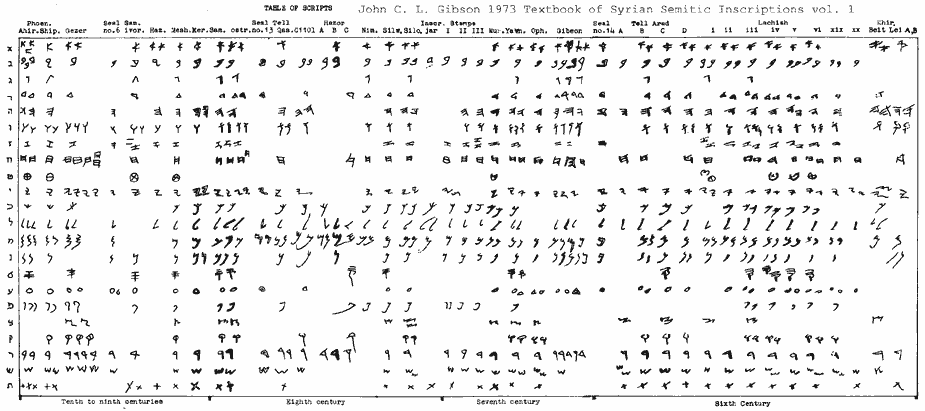- Previous message: Mark E. Shoulson: "Re: why Aramaic now"
- In reply to: Michael Everson: "Re: why Aramaic now lumpers and splitters"
- Next in thread: Michael Everson: "Re: Ancient Northwest Semitic Script (was Re: why Aramaic now)"
- Reply: Michael Everson: "Re: Ancient Northwest Semitic Script (was Re: why Aramaic now)"
- Messages sorted by: [ date ] [ thread ] [ subject ] [ author ] [ attachment ]
- Mail actions: [ respond to this message ] [ mail a new topic ]
Michael Everson wrote to the Unicode email list at 8:44 PM on Wednesday,
December 24, 2003:
>There is zero chance that Phoenician will be considered to be a glyph
>variant of Hebrew. Zero chance.
If you are thinking of chronology and mean that Phoenician came first,
most scholars would agree with you. But I would ask, so what? What does
chronological priority have to do with establishing separate encodings?
Should Latin be separately encoded?
On the other hand, if you mean that both Hebrew and Phoenician are not
glyphic variants of the same script system, then I know of no scholar who
would agree with you.
Ancient Phoenician, Punic, Hebrew, Moabite, Ammonite, and Aramaic are
different dialects and/or languages commonly written with the same right-
to-left script system containing the same 22 non-numeric characters and
exhibiting no more glyphic variation over a period of a thousand years
than that seen in the various manifestations of the Latin alphabet. (For
a sampling of ancient Phoenician, Moabite, and Hebrew glyphic variation
see the attached script chart taken from Gibson's Textbook of Syrian
Semitic Inscriptions - volume 2 has samples of Aramaic glyphic variants.)
I see no justification for separately encoding Phoenician. If you did
encode it, where, and on what bases, then would you draw the lines for
the separate encodings of the other ancient Northwest Semitic languages
and periods (because that's what these are, other languages and periods,
and not other scripts)? What we have here is a continuum of glyphic
variation within a single script system.
>The number of books about writing
>systems, from children's books to books for adults, which contain
>references to the Phoenician alphabet as the parent to both Etruscan
>and Hebrew, are legion.
Using the same reasoning, we should separately encode Latin, the parent
script for English, German, French, Spanish, Italian, ...
>Some scholars may decide to transliterate all Phoenician texts into
>Hebrew script and read only that, and retrieve it from their
>databases, and that is perfectly fine. Lots of people transliterate
>Sanskrit into Latin and never use Devanagari.
By definition, one cannot "transliterate ... Phoenician texts into Hebrew
script". Unlike your example of Devanagari and Latin, Phoenician and
Hebrew share a common script system.
-----------------------------------------
I think the real problem here arises from the fact that medieval and
modern Hebrew, a superset of the ancient Hebrew script, with vowels,
punctuation, and cantillation marks added to late glyphic variants of the
22 ancient Northwest Semitic consonants, was encoded in Unicode without
considering Phoenician, Aramaic, etc. at the same time, and now there is
resistance to using Unicode characters with "Hebrew" in their names to
write Phoenician, Aramaic, etc. (Imagine if the Latin consonants had been
named "ENGLISH CAPITAL LETTER A, ..."!)
I see three solutions to the problem:
1) Do nothing - leave everything the way it is and use the 22 "Hebrew"
consonants for all ancient Northwest Semitic alphabetic text.
2) Rename the 22 shared consonants now in the Hebrew block to something
like "ANCIENT NORTHWEST SEMITIC ALEPH", etc. (The actual name needs to be
finessed because Ugaritic is a Northwest Semitic language but uses a
different script system.)
3) Separately encode the ancient Northwest Semitic script.
It isn't strictly Uniocdesque (because the characters are in fact already
encoded), but I think I prefer solution 3. It would be very simple to do
(many of us can rattle them off the top of our head) and it would give us
a unified block for this ANCIENT PHASE of the script to which we could
then attach those characters, numbers, and punctuation marks needed to
cover completely the rest of ancient usage.
Respectfully,
Dean A. Snyder
Scholarly Technology Specialist
Library Digital Programs, Sheridan Libraries
Garrett Room, MSE Library, 3400 N. Charles St.
Johns Hopkins University
Baltimore, Maryland, USA 21218
office: 410 516-6850 fax: 410-516-6229
Manager, Digital Hammurabi Project: www.jhu.edu/digitalhammurabi

- Next message: Michael Everson: "Re: why Aramaic now lumpers and splitters Samaritan"
- Previous message: Mark E. Shoulson: "Re: why Aramaic now"
- In reply to: Michael Everson: "Re: why Aramaic now lumpers and splitters"
- Next in thread: Michael Everson: "Re: Ancient Northwest Semitic Script (was Re: why Aramaic now)"
- Reply: Michael Everson: "Re: Ancient Northwest Semitic Script (was Re: why Aramaic now)"
- Messages sorted by: [ date ] [ thread ] [ subject ] [ author ] [ attachment ]
- Mail actions: [ respond to this message ] [ mail a new topic ]
This archive was generated by hypermail 2.1.5 : Fri Dec 26 2003 - 03:01:33 EST